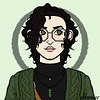Take a photo of a barcode or cover
What I appreciated:
- Diverse character representation
- The setting of Mosima; I could truly picture the landscape, and the underground world that El-Arifi imagined was so vibrant and beautifully described.
- The relationships between the characters, especially the complicated sister relationship between Yeeran & Lettle
- The different systems of magic
What would have made this book even better:
- The end of the novel felt a little rushed to me. I appreciate that this was structured to be the first in a series, and I was completely okay with the loose ends and questions that we were left with at the end of the book. But I still felt like so many hugely significant events happened in a very short period of time, and we don't really get to see the characters process these events.
- I would have loved to have seen the obeah play a more prominent role in the book. I don't want to say much more, as I don't want to provide any spoilers, but I will just say that this was one particular area where I was really hoping for *more*.
I'm very much looking forward to the next installment in the series. Thank you to NetGalley for my digital ARC.
Graphic: Grief, Murder, War, Classism
Moderate: Animal death, Violence, Blood, Death of parent, Abandonment, Injury/Injury detail
Minor: Sexual content, Dementia
Graphic: War
Moderate: Violence, Death of parent, Injury/Injury detail
- Saara has brought us a new world and she was able to give us its information without info dumping on us, thank you for that. It is more unique while including elves and fae.
- The diversity
- Everything was so predictable. Lettle couldn’t tell who her prophecies were about, but I could a mile away. Is she just oblivious? Hopeful?
- All of the “wow” and “climatic” scenes felt everything but, it felt rushed and moved on. Where is the drama?!
- It started out feeling like a military fantasy in the beginning, then trickled to just a regular fantasy, and then a romance fantasy after 200 pages?
- Maybe this is intentional but Lettle feels young and immature, when I think she’s supposed to an adult. I do not feel like she had much character development
- Her relationship with Rayan felt a bit pushed and rushed.
- Why isn’t Lettle telling anyone about her prophecies? Especially if she thinks she’s going to harm her beloved Rayan? None of that made sense.
- Yeeran & both of her relationships didn’t make sense either. I felt almost blindsided and confused about her and Furi’s sudden relationship and closeness. Maybe it was just the fighting tension and Furi knowing everyone and Yeeran is new? I felt we could have had more relationship building between them.
- I’m also confused how Yeeran is going to ask Furi to come OUTSIDE of Mosima, when Yeeran knows she literally cannot!?
- Just 310 pages and it took a week to read. It was difficult to want to pick up and continue. Will I read this again? No. Would I read the sequel? I’d give it a try to see if it gets any better.
Moderate: Violence, Murder, War
There were a few moments that left me a bit confused by the authors choices, but those moments were overshadowed by how interesting and thought provoking the rest of the book is.
Graphic: Animal death, Sexual content
Moderate: Animal cruelty, Death, Violence, Death of parent, War
I love how they handled the relationships. The way they respected the established relationship at the beginning and the new relationships were respectful and realistic. The relationships weren't one size fits all either. While the main characters didn't necessarily indulge in multiple partners, there was no judgement on those who did. The society built was accepting of all relationships including the ones around gender. "Like many elves, Motogo's gender was as flexible as the weather..."
There were a couple things I guessed before they happened, but it’s better that way in my opinion so it doesn’t feel like it’s coming out of nowhere. There were one or two things that surprised me as well.
The way the book handled war was also powerful. It put the politicians at the center and I respect that. People forget why wars are fought and this was a stark reminder. It didn’t shy away from classism either. All in all, I thought it was a fantastic book.
Graphic: Animal death, Sexual content, Violence, Grief, Murder, Abandonment, War, Classism
Moderate: Child abuse, Child death, Genocide, Racial slurs, Toxic relationship, Dementia, Death of parent
Minor: Slavery, Trafficking, Kidnapping
Also, Pila is adorable. Her and Andara from FW would be good friends.
Graphic: Animal death, Chronic illness, Death, Violence, Murder, War
Moderate: Sexual content
Graphic: Animal death, Violence, War
Moderate: Death, Sexual content, Xenophobia, Murder, Injury/Injury detail
Minor: Confinement, Grief, Death of parent
Plot:
The storyline begins the second the writing does. You're following the story of Yeeran and Lettle, two sister elves exploring an unknown land as Yeeran enters exile. The action is near constant with new events occurring almost every chapter. I found it hard to put the book down, constantly wanting to know what was going to happen next and telling myself "just one more" long after my bedtime. Perhaps the most impressive feat of the plotline is the double plot-twist occurring at the climax of the book. While I had my suspicions about one, I was truly surprised (and went "AHHHHH!!!") at the other one. I was excited by the constant rise and fall of hope presented in the plot as new challenges continued to arise and were overcome, some more than others. It's been a while since I was gripped by a book from the very beginning, thus earning Faebound and El-Arifi my first 5-star rating of the year.
Characters:
Character development in this story was well done for a first book. While all of the main characters experienced a broadening of their knowledge and understanding of the world, some took to it better than others. With characters who are all starkly different, often grating against each other regardless of how much love they share, the reader gets to experience multiple perspectives on the events of the plot as the story goes on. You find yourself sympathetic for, and irritated with, all of the characters for different reasons, which in turn allows you to understand their actions or the reactions of others. While many first books in a series struggle to demonstrate substantial character development before the second book, El-Arifi does a great job of making the characters flexible from the beginning, though their core characteristics are firm and consistent the whole way.
World building, setting, and magic system:
I found the world of Faebound quite fascinating. Not so different from our own, but different enough to keep the reader curious, Faebound explores different roles within a society, as well as different peoples within a greater world, and the conflicts that arise amongst them. The descriptions are beautiful and vivid, allowing the reader to envision the characters' experiences with clarity. The magic system was also incredibly interesting, with details and explanations emerging progressively throughout the book. This allowed readers to learn alongside the main characters, but never left the reader wondering how it all fit together or whether they were missing something. I was extremely satisfied by the explanations and depictions of the world's magic, which remedies the only complaints I had about The Final Strife, another first book in an El-Arifi fantasy series. You can see the growth in El-Arifi as an author, and it is quite pleasing to witness in real time.
Graphic: Chronic illness, Confinement, Death, Mental illness, Physical abuse, Violence, Blood, Grief, War, Injury/Injury detail
Moderate: Animal death, Bullying, Child abuse, Hate crime, Medical content, Death of parent, Murder, Abandonment
I received this copy through NetGalley for an honest review.
Graphic: Animal death, Death, Sexual content, Murder
Moderate: Racism, Violence, Xenophobia, War, Injury/Injury detail
Minor: Grief, Death of parent, Pregnancy
Graphic: Grief, Classism
Moderate: Death, Genocide, Violence, Death of parent, War
Minor: Confinement, Colonisation






